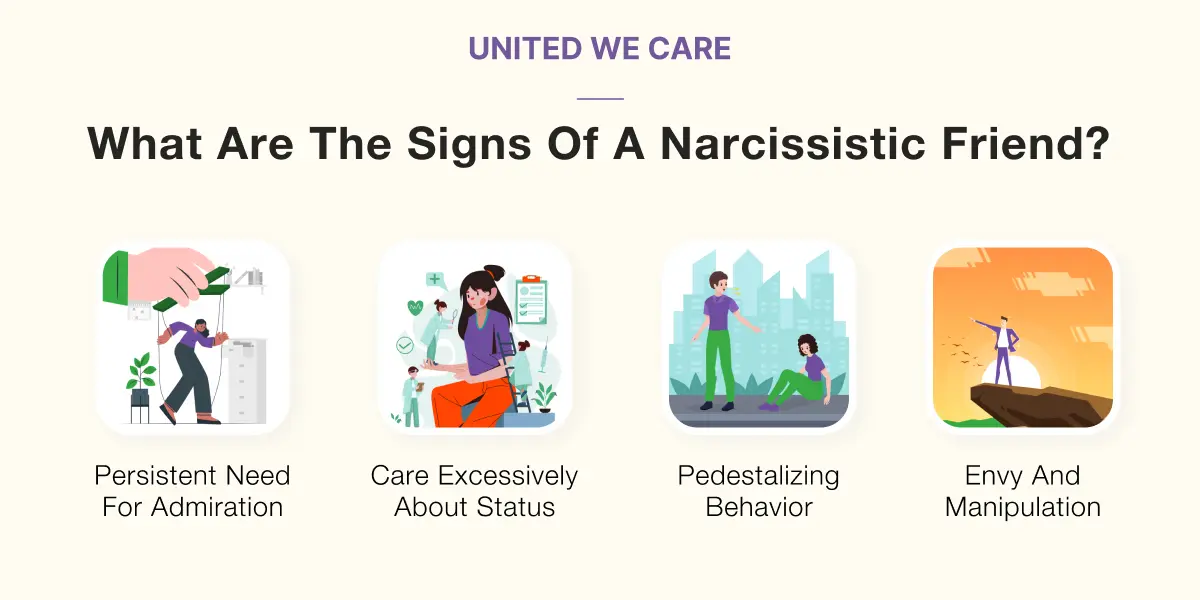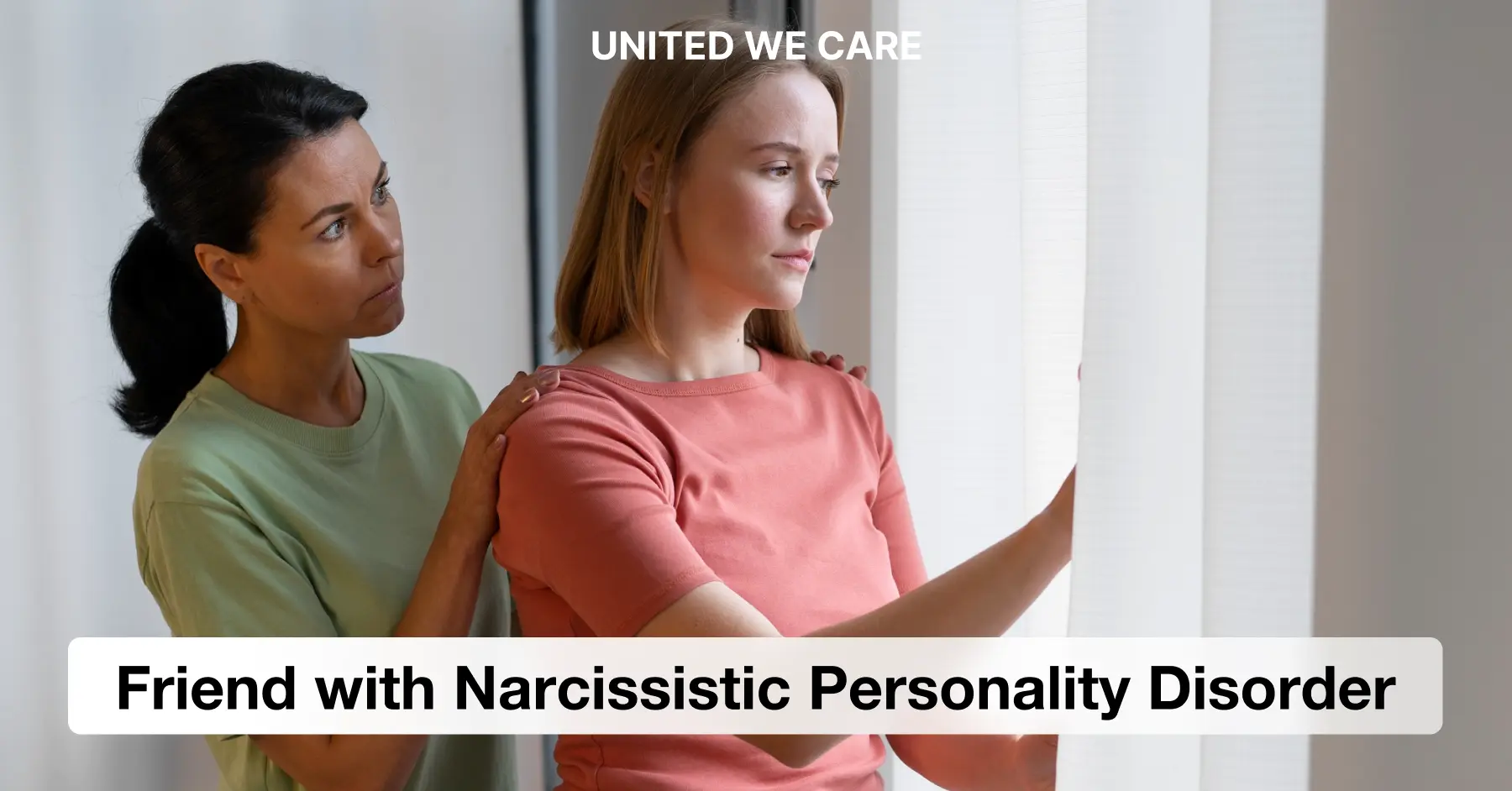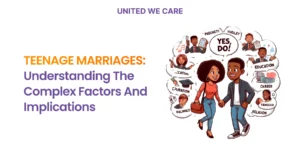Introduction
Friendship may seem like a relatively easier interpersonal relationship to sustain, but narcissism can make it pretty hard to handle. Having a friend with narcissistic personality disorder tends to be a source of stress in most people’s lives.
Typically, it’s because of the high emotional volatility and unrealistic expectations posed by the narcissistic friend. In this article, we’re going to take a closer look at these dynamics and discuss how narcissism affects friendships.
Narcissistic Personality Disorder and Friendships
It is important to understand that NPD, as the name suggests, is a personality disorder. This means that the maladaptive patterns of behavior caused by it are relatively permanent and show up in all areas of life. So, when it comes to friendship with someone diagnosed with narcissistic personality disorder, even that relationship is impacted.
Furthermore, most people displaying signs of narcissism are very unlikely even to admit they have a problem. This is a psychological disorder of severe denial. Therefore, it is rare that someone with this mental health condition would be willing to seek professional help.
Researchers say that narcissism may actually be beneficial for the formation of a friendship. Most narcissists tend to set a charismatic and charming first impression. However, the same narcissistic tendencies end up being detrimental to the maintenance of the friendship [1].
Read more- Narcissistic Personality Disorder
Signs of a Narcissistic Friend
How do you know if you have a narcissistic friend? If you’re asking this question, don’t worry. There are some blatantly obvious signs that your friend might have narcissistic tendencies. The following are some of these signs, though bear in mind that these are for educational purposes only and not to diagnose anyone.

Persistent Need for Admiration
A narcissistic friend will have a constant need to be admired and complimented. Whatever effort they make to sustain a friendship, they will need it acknowledged and praised. Moreover, in times of duress, they will remind you of all the things they have done for you.
This need for admiration can also pop up if they think you are getting more attention than them. They won’t be able to stand it not being the center of attention. Also, they tend to get offended if they are not admired or acknowledged for their level of satisfaction.
Care Excessively About Status
Secondly, people with narcissistic personality disorder care a lot about power, status, and social acceptance. They will not see it worth their time or resources to mingle with someone who isn’t considerably successful from their perspective.
Usually, this includes how much material wealth a person has, what type of clothes they wear, and what social connections they have. If they see someone with these desirable traits of clout, they will proactively work towards building a friendship.
Pedestalizing Behavior
A narcissistic friend is likely to think in binaries and see the world in black or white. Either they love you and think you are worthy of worship, or they positively despise you and think you’re worthless.
If you do things to please your narcissistic friend, you might stay on the pedestal and receive plenty of affection. But if any time you end up offending them, even if you didn’t do it on purpose, they won’t hesitate to cut you off from their life.
Envy and Manipulation
Additionally, a narcissistic friend is prone to feelings of jealousy and envy. They might not be able to celebrate your wins with you because they feel threatened. Maybe they won’t do this to your face, but you can see it from how they talk about others.
Furthermore, narcissistic friends tend to be exploitative and manipulative. They may use emotional blackmail and feelings of fear, obligation, and guilt to coerce you to do things you don’t want to do.
Read more about Narcissistic Relationship
The Impact of Friend with Narcissistic Personality Disorder
Narcissism impacts friendships differently based on which stage of friendship you are in. In the early stages, narcissism can actually cause friendships to flourish. Generally, someone with narcissistic personality disorder seems very charismatic and charming. Even researchers have found that friends initially find narcissistic bragging very entertaining [1].
Unfortunately, the initial charm wears off, and the darker sides of the narcissism taint the friendship. For instance, the same bragging starts seeming self-centered, and you might even grow indifferent to it.
Clinically, this impact of narcissism on friendship is seen to be affected by two tendencies: narcissistic admiration and narcissistic rivalry. The former is characterized by assertive self-enhancement and self-promotion. The latter is characterized by self-protection and self-defense [2].
Studies have found that not feeling appreciated was related to subsequent increases in narcissistic rivalry, while more agentic and antagonistic behavior was related to subsequently lower perceptions of appreciation [3].
How to Help a Friend with Narcissistic Personality Disorder who Refuses to Get Treatment
Being friends with someone with narcissistic personality disorder is hard enough. Let alone try to help them get treatment. Nevertheless, here are some of the things you can do to push them in the right direction.
Read Up About NPD
Firstly, you will only be able to help such a friend if you know details about narcissistic personality disorder. There are plenty of resources online and some dedicated YouTube channels for education on narcissism that you can consult.
Model Healthy Boundaries
People often think that boundaries create distance in relationships. However, in reality, they help preserve a relationship instead of letting it break off permanently. You need to drive this message home to your friend and assert healthy boundaries. This will require patience and perseverance.
Use Compassion and Empathy
In order to sustain the above-mentioned patience, you need to offer your friend compassion. Put yourself in their shoes and try to see how their pain and inner shame is causing their narcissistic tendencies.
Practice Accountability
Having said that, empathy does not mean that you can condone their wrongdoings. You must hold them accountable and show them how relationships cannot be healthy or sustainable without mutual respect and accountability.
Offer Support for Professional Help
Finally, they might be hesitating to get help due to denial, shame, or stigma. Try to understand what their reservations are and offer support to overcome these challenges. With your insistence and support, maybe they will agree to get help.
Learn Empathy to Deal with a Narcissistic Friend
Before we can end this article, it is imperative to emphasize that it is not possible to deal with narcissism in a friendship without empathy. After all, even though your friend may have toxic traits, they are ultimately suffering from a mental health condition.
Remember, the empathy needs to be for both your friend as well as yourself. Stand up for yourself and be firm with your boundaries. At the same time, try not to take their behavior personally, and when required, take some time off to recharge yourself with self-care.
More information about – Narcissistic Marriage
Conclusion
If you have a friend with narcissistic personality disorder, you might experience several unpleasant situations because of their behavioral tendencies. Friends with NPD tend to have an excessive need for admiration, care too much about status, pedestalize people, and become manipulative due to envy.
Naturally, this impacts the friendship in various ways, most of which are detrimental. If you want to support your friend with NPD and help them get treatment, there are a few steps you can take. To learn more about this, you can always speak to our experts at United We Care.
References
[1] Maass, U., Wehner, C. and Ziegler, M., 2018. Narcissism and friendships. Handbook of trait narcissism: Key advances, research methods, and controversies, pp.345-354.
[2] Sauls, D., & Zeigler-Hill, V. (2020). The narcissistic experience of friendship: The roles of agentic and communal orientations toward friendship. Journal of Social and Personal Relationships, 37(10-11), 2693-2713. https://doi.org/10.1177/0265407520933685
[3] Wehner, C. and Ziegler, M., 2023. Narcissism and friendship quality: A longitudinal approach to long-term friendships. Journal of Social and Personal Relationships, 40(2), pp.670-692.










